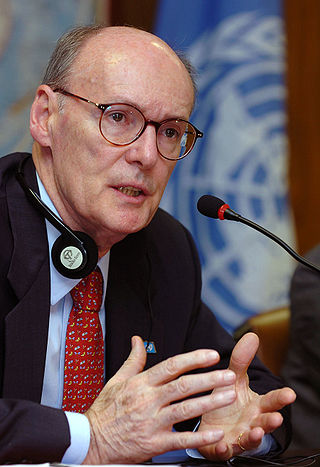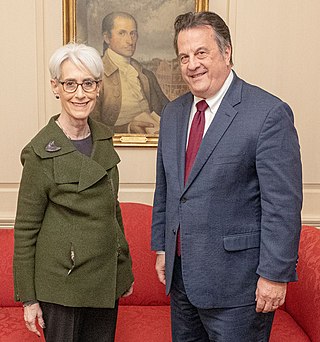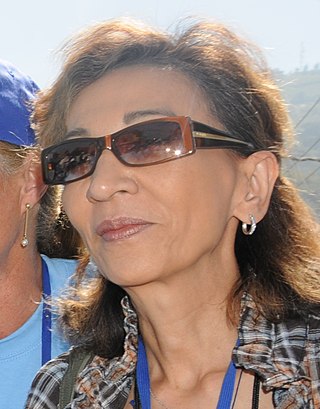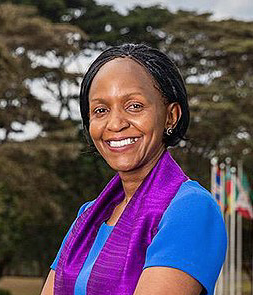Dr. Nigel Fisher | |
|---|---|
| Nationality | Canadian |
| Citizenship | Canadian |
| Occupation(s) | Crisis management and response |
| Organization | United Nations |
| Title | United Nations Assistant Secretary-General |
| Awards | The Order of Ontario, The Order of Canada [1] |
Dr. Nigel Fisher | |
|---|---|
| Nationality | Canadian |
| Citizenship | Canadian |
| Occupation(s) | Crisis management and response |
| Organization | United Nations |
| Title | United Nations Assistant Secretary-General |
| Awards | The Order of Ontario, The Order of Canada [1] |
Born in Hereford UK, Nigel Fisher graduated with a B.A. degree from the University of Wales and obtained an M.A. in political science from McMaster University in Hamilton, Ontario, Canada, where he met his wife Jennifer. After becoming Canadians, they both worked with the Canadian University Service Overseas in Nigeria and in Ottawa.
After working with Canada’s International Development Research Centre in Ottawa, Fisher began his United Nations career with Unicef in Laos in 1977, before moving on to India, Mozambique and then as the agency’s Representative in the People’s Democratic Republic of Yemen. In 1988, he was appointed Deputy Executive Secretary of the World Conference on Education for All (Jomtien, Thailand, 1990), following which he became Unicef’s Deputy Regional Director for the Middle East and North Africa and Area Representative for Jordan, Syria, the Occupied Territories and Djibouti. In 1994, he was appointed Unicef’s Special Representative for Rwanda and Great Lakes, to lead Unicef’s post-genocide reconstruction operations. He then became director of the organisation’s Office for Emergency Operations and was influential in the development of Unicef’s Anti-war Agenda. [2] Following a sabbatical year working on the issue of children affected by armed conflict, as Visiting UN Fellow at the Canadian Centre for Foreign Policy Development, in Canada’s then-Department of Foreign Affairs and International Trade, he became Unicef’s Regional Director for South Asia. Immediately after the attack on New York’s World Trade Center on 11 September 2001, Fisher was appointed Unicef’s Special Representative for Afghanistan and border areas.
In early 2002, he was appointed by the UN Secretary-General as Deputy Special Representative of the Secretary-General in the United Nations Assistance Mission in Afghanistan (UNAMA), at the rank of Assistant Secretary-General. He was simultaneously Designated UN Security Official, UN Resident Coordinator and Humanitarian Coordinator, coordinating the humanitarian and reconstruction operations of UN agencies and their partners. [3] His next appointment was as Director of the United Nations Office for Project Services (UNOPS), again at the rank of Assistant Secretary-General. [4]
After leaving the United Nations in 2005, he was appointed President and CEO of Unicef Canada. [5] Under his leadership, Unicef Canada published a landmark report on the discrimination, health challenges and health care obstacles faced by Canada’s aboriginal children. [6] In April 2010, he was recalled by the United Nations to assume the role of acting Deputy Special Representative of the Secretary-General in the United Nations Stabilisation Mission in Haiti (MINUSTAH), Resident UN Coordinator and Humanitarian Coordinator. [7] In July 2010, he was confirmed in the position, [8] which he occupied until early 2013, when the Secretary-General appointed him as acting Special Representative of the Secretary-General, overseeing all MINUSTAH operations in Haiti. [9] His final UN appointment was as the Regional UN Humanitarian Coordinator for the Syria Crisis, based in Amman, Jordan. [10]
Since leaving the UN, Fisher has acted as a consultant to the United Nations, including to the World Humanitarian Summit (2014), to Governments in Asia and the South Pacific on disaster preparedness and post-disaster recovery, as well as to several foundations. He has been a board director and advisor for a number of international philanthropic organizations and business enterprises. Fisher has also had cameo acting roles in two films directed by Sean Penn: as Ivan in The Last Face (2016) and as Dr. Halstead in Flag Day (2021) [11]
Fisher is currently an Adjunct Professor in the Faculty of Applied Science at the University of British Columbia, Canada.
Nigel Fisher is an Officer of the Order of Canada, [12] a member of the Order of Ontario [13] [14] and has been awarded Canada’s Meritorious Service Cross (M.S.C.), [15] the Pearson Peace Medal, [16] [17] the Canadian Medical Association’s Medal of Honour [18] and the Queen Elizabeth II Diamond Jubilee Medal. [19] He holds an honorary LL.D. degree from McMaster University, [20] his alma mater, where he has also been appointed to the Alumni Gallery. [21]
Fara, M.S. and Fisher, N. (1988). The 1984 Literacy Campaign in the People’s Democratic Republic of Yemen: A Case Study. UNESCO, Unicef, WFP Cooperative Programme. UNESCO Paris, 1988.
Fisher, N. (1998). Children in Armed Conflict and Canada’s Foreign Policy Agenda. In Canadian Foreign Policy Journal, Vol. 6, No.1 (Fall 1998), Ottawa, pp. 105–111.
Fisher, N. (2002). Commitment to Children – The Track Record. In Himal South Asia, January 2002, Kathmandu, pp. 56–57.
Fisher, N. (2000). Communication for Development and Social Change. In Media Asia, Vol. 27 – Issue 1 (2000), AMIC Manila, pp. 33–35.
Fisher, N. (1989). Concern resurges in global crisis. In Focus: Basic Education, Unicef Intercom No.52, April 1989, New York, pp. 1,2,6.
Fisher, N. (2002). Leadership and Impunity: The Politics Behind the Traumatization of Children During Armed Conflicts. In Traumatology Vol. 8 No.3, Special Issue: Children and War. September 2002, pp. 146–159.
Fisher, N. (2001). Lederskap og straffefrihet – politikken bak traumatisering av barn under vaepnede konflikter. In Dyregrov D., Lorontzen G., Raaheim K. (eds.) Et Liv For Barn – Utfordringer, omsorg og hjelpetiltak. Bergen: Fagbokforlaget, 2001, pp. 222–237.
Fisher, N. (1999). Mediating for Children: Child Protection in Armed Conflicts. In Cahill K.M. (ed.) A Framework for Survival: Health, Human Rights and Humanitarian Assistance in Conflicts and Disasters (rev). London, Routledge 1999, pp. 60–95.
Fisher, N. (2014). The inheritance of loss. In Forced Migration Review 47, September 2014, pp. 4–5.
Fisher, N. (1974). The Potters of Buan. In Tactile, May–June 1974, pp. 8–9. The Canadian Guild of Potters.
Haddad W.D., Colletta N.J., Fisher N., Lakin M., Sutton M., Windham D. (1990). Meeting Basic Learning Needs: A Vision for the 1990s. The Inter-Agency Commission for the World Conference on Education for All, New York, April 1990.

The United Nations Assistance Mission in Afghanistan is a UN Special Political Mission tasked with assisting the people of Afghanistan.

Geoffrey Arthur Holland Pearson was a Canadian diplomat and author. He was the son of former Prime Minister of Canada Lester B. Pearson and Maryon Pearson.

The United Nations Stabilisation Mission in Haiti, also known as MINUSTAH, an acronym of its French name, was a UN peacekeeping mission in Haiti from 2004 to 2017. It was composed of 2,366 military personnel and 2,533 police, supported by international civilian personnel, a local civilian staff, and United Nations Volunteers. The mission's military component was led by the Brazilian Army and commanded by a Brazilian.

An under-secretary-general of the United Nations (USG) is a senior official within the United Nations System, normally appointed by the General Assembly on the recommendation of the secretary-general for a renewable term of four years. Under-secretary-general is the third highest rank in the United Nations, after the secretary-general and the deputy secretary-general. The rank is held by the heads of different UN entities, certain high officials of the United Nations Secretariat, and high-level envoys. The United Nations regards the rank as equal to that of a cabinet minister of a member state, and under-secretaries-general have diplomatic immunity under the UN Charter.
A special representative of the Secretary-General is a highly respected expert who has been appointed by the Secretary-General of the United Nations to represent them in meetings with heads of state on critical human rights issues. The representatives can carry out country visits to investigate alleged violations of human rights and act as negotiators on behalf of the United Nations.

Hédi Annabi was a Tunisian diplomat and Special Representative of the United Nations Secretary-General, Head of the UN Stabilization Mission in Haiti (MINUSTAH). He was previously an Assistant-Secretary-General at the United Nations Department of Peacekeeping Operations, from 1997 to 2007.

The United Nations Assistance Mission for Iraq (UNAMI) was formed on 14 August 2003 by United Nations Security Council (UNSC) Resolution 1500 at the request of the Iraqi government to support national development efforts.

David Gressly was the United Nations Resident Coordinator / Humanitarian Coordinator for Yemen Prior to that he was the United Nations Deputy Special Representative for the Democratic Republic of the Congo. He also previously served as Deputy Special Representative in the United Nations Multidimensional Integrated Stabilization Mission in Mali (MINUSMA).

Staffan de Mistura is an Italian-Swedish diplomat, United Nations official and former member of the Italian government.

Kul Chandra Gautam is a diplomat, development professional, and a former senior official of the United Nations. Currently, he serves on the boards of several international and national organizations, charitable foundations and public-private partnerships. Previously, he served in senior managerial and leadership positions with the United Nations in several countries, in a career spanning over three decades. He is a former deputy executive director of UNICEF and Assistant Secretary-General of the United Nations.
Omar Abdi is a Somali-Canadian diplomat. He serves as the Deputy Executive Director of the United Nations Children's Fund (UNICEF).

Ross Stewart Mountain has spent most of his career in the service of the United Nations working on humanitarian, recovery, development and peacekeeping operations in Asia, Africa, the Middle East, the Caribbean, and the Pacific as well as assignments based in Geneva, Switzerland promoting non-governmental action and managing UN humanitarian operations.

Kim Bolduc is the Deputy Special Representative of United Nations Stabilization Mission in the Democratic Republic of Congo (MONUSCO). She served previously as the head of the United Nations Mission for the Referendum in Western Sahara (MINURSO) and the Deputy Special Representative for the United Nations Stabilization Mission in Haiti (MINUSTAH). In tandem, she will be also the United Nations Resident and Humanitarian Coordinator. She has previously held other positions with the United Nations.
Bo Schack is a Danish lawyer. On 5 January 2010 he was appointed by the United Nations Secretary-General Ban Ki-moon as Deputy Special Representative of the Secretary General in the Central African Republic. This appointment is in addition to the nominations in October 2009 as the United Nations Resident and Humanitarian Coordinator, as well as UNDP Resident Representative in the country. Since 1985 he has been working for United Nations primarily in the humanitarian field.
Peter de Clercq is a Dutch diplomat who currently is the Deputy Special Representative of the Secretary-General for the United Nations Assistance Mission in Somalia (UNSOM), where he also serves as United Nations Resident Coordinator, Humanitarian Coordinator and United Nations Development Programme (UNDP) Resident Representative. He was appointed to this position by United Nations Secretary-General Ban Ki-moon on 18 June 2015.

Carolyn McAskie is a Canadian diplomat and former assistant secretary-general for peacekeeping at the United Nations. She was the head of the United Nations mission to Burundi (ONUB) in 2004, making her the first Canadian to lead a United Nations peacekeeping mission following the UN's switch to complex missions.

Denise Brown is a Canadian Senior UN official and the current Head of the United Nations in Ukraine. She was appointed to this position on 28 July 2022. Prior to this appointment, she served as Deputy Special Representative of the Secretary-General (DSRSG), Humanitarian Coordinator and Resident Coordinator in the Central African Republic.

Joyce Msuya is a Tanzanian microbiologist and environmental scientist who has been serving as Assistant Secretary-General for Humanitarian Affairs and Deputy Emergency Relief Coordinator in the United Nations Office for the Coordination of Humanitarian Affairs since 2021. From 2018 to 2021, she served as the Deputy Executive Director of the United Nations Environment Programme (UNEP) at the level of Assistant Secretary-General.

Sara Frances Beysolow Nyanti is an international development expert, Liberian pastor and since February 2024 the Foreign Minister of Liberia. She has more than 20 years of professional experience. She was the United Nations Assistant Secretary General from December 2021 to her retirement in July 2023.